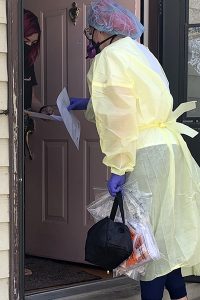A new focus
 Even though we as a group are introverted scientists, I think we are learning how much of our routine is predicated on social interaction. We are always talking with colleagues and walking over to the next lab for a piece of advice or to borrow some trivial reagent. It’s so important to be able to think out loud or ask a colleague about some detail. This is all much more difficult under the present circumstances.
Even though we as a group are introverted scientists, I think we are learning how much of our routine is predicated on social interaction. We are always talking with colleagues and walking over to the next lab for a piece of advice or to borrow some trivial reagent. It’s so important to be able to think out loud or ask a colleague about some detail. This is all much more difficult under the present circumstances.
We’re not as productive as before, but I think that everyone is very focused on the tasks at hand and appreciative of the opportunity to be involved in important and rewarding work. Perhaps this focus will counterbalance the challenges, and there is no doubt that important science will come from our activity this summer.
—Darrell R. Davis, chair, Department of Medicinal Chemistry
The little things
I have had little real change except that instead of physically moving between meetings I just change which one I’m logged into. The downside of that is I no longer have that cushion of “travel time” between meetings. So, I have less downtime and my brain gets full. The related difficulty is that I tend to work longer hours and it’s harder to “turn off” at the end of the day.
We have done several online social things. Last night the College of Nursing did a really nice tribute to Florence Nightingale, and they have several regular social and informal sessions. Biomedical Informatics does their weekly coffee hour social online, too. Those have actually been really useful for people to stay connected and they fill a really important need.
—Kathy Sward, associate professor, College of Nursing
Invent a new wheel
 While it's becoming the "new normal" to wear PPE all day and provide nursing care with an ever-questioning mindset, we are learning and evolving every day. In some ways, we have learned how to move processes and approvals through the appropriate channels at impressive rates to meet the needs of research participants and to help find solutions in real-time. I am very fortunate to work with a team that has been extremely supportive in advocating for the proper tools for caring for our participants with such a focus on safety.
While it's becoming the "new normal" to wear PPE all day and provide nursing care with an ever-questioning mindset, we are learning and evolving every day. In some ways, we have learned how to move processes and approvals through the appropriate channels at impressive rates to meet the needs of research participants and to help find solutions in real-time. I am very fortunate to work with a team that has been extremely supportive in advocating for the proper tools for caring for our participants with such a focus on safety.
So much change makes it feel like we're reinventing the wheel but when I reflect on the last few months and the progress that's been made moving forward, I think we are in fact assisting in inventing a different kind of wheel. It’s challenging to not know when or if things will ever go back to the normal I've known as a nurse. I try to remind myself that everything I've learned related to my profession that was considered normal had to be discovered or figured out. It's nice to think we get to be a part of that process.
—Samantha Hess, clinical research nurse, Center for Clinical and Translational Science
Use time wisely
As a research scientist, the most difficult thing is not being able to do experiments. With the switch to orange, we are very slowly and very carefully getting back to the lab to perform some limited experiments that are important for our National Institutes of Health contract and grant work so that we can achieve our deliverables. We have taken the time however to develop some rigor and reproducibility documents and involved the whole staff. So when we return to the lab, we will be more efficient.
—Karen Wilcox, chair, Department of Pharmacology and Toxicology
Change is a constant
 People are doing their best to do the right thing for their family, friends, coworkers and neighbors. They are minimizing time on campus and, when they do work onsite, are following a set of policies we have established to maximize distancing and minimize lab density. They continue to get a lot of work done from home.
People are doing their best to do the right thing for their family, friends, coworkers and neighbors. They are minimizing time on campus and, when they do work onsite, are following a set of policies we have established to maximize distancing and minimize lab density. They continue to get a lot of work done from home.
The hardest thing, frankly, has been the challenge of anticipating what the next week will bring. As an administrator, it is been difficult to try to establish strong and clear policies and an effective communication strategy in such a dynamic situation. We all fear a resurgence of the virus, which could lead to more restrictions. But if things stay as they are, we will be able to keep progressing.
—Scott Summers, chair, Department of Nutrition and Integrative Physiology
Banner photo credit: Bryan Jones
